| Srl | Item |
| 1 |
ID:
105348
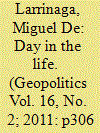

|
|
|
|
|
| Publication |
2011.
|
| Summary/Abstract |
This article shares its title with a Beatles' song in which John Lennon wove together several newspaper stories from a particular day to create "A Day in the Life". As with the idea behind Lennon's lyrics I would like to provide a tomogram of global governmentality by using a specific day's events to examine transformations in the current world (dis)order. On November 20th, 2003, several events occurred, including the bomb attack on the British Consulate and the HSBC bank headquarters in Istanbul; a presidential visit by George W. Bush to London accompanied by antiwar protests; suicide bombings in Kirkuk and Ramadi; an evacuation of staff from the White House due to a "blip" on a radar screen rather than a plane; anti-FTAA protests and clashes with police in Miami; all these events can be used as a barometer to examine global governmentality and the current predicament of the representation of global order. This analysis is framed within the broader context of a questioning of the "eventness" of the event, agency and territoriality in contemporary world politics, as well as the process and significance of dating in representing global order. In doing so it attempts to highlight the tensions between global politics understood and articulated from a sovereign optic and an understanding of global politics as a site of governmentality and transversal struggles in a world where "9-11" and the "war on terror" provide the fundamental markers of current representations of contemporary global social order.
|
|
|
|
|
|
|
|
|
|
|
|
|
|
|
|
| 2 |
ID:
105350
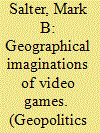

|
|
|
|
|
| Publication |
2011.
|
| Summary/Abstract |
Video games are important sites for critical geopolitics, and this article engages in the analysis of Diplomacy, Civilization, America's Army, and Grand Theft Auto IV in order to understand how the geopolitical imaginary works in popular culture. It makes the argument that the claim to geopolitical and tactical verisimilitude is at odds with the representations of violence and the body in war. It concludes by mapping new directions for the study of video games.
|
|
|
|
|
|
|
|
|
|
|
|
|
|
|
|
| 3 |
ID:
105353
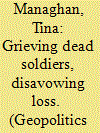

|
|
|
|
|
| Publication |
2011.
|
| Summary/Abstract |
The article investigates the conditions of emergence of Cindy Sheehan (mother of soldier killed in Iraq) as a spokesperson of the American antiwar movement and its so-called 'spark.' It interrogates the emotional pull of the current 'support the troops' rhetoric and the usurpation of this and other patriotic signs and symbols by various antiwar groups as both a constraint on the realm of legitimate dissent and an enabling condition of intelligible subject formation - with particular attention given to the figure of the grieving mom. This article argues that the sympathetic, albeit tenuous, identification with this figure emerged through a simultaneous psychic identification with and disavowal of loss - with implications for the possibility and impossibility of dissent in the aftermath of 9/11.
|
|
|
|
|
|
|
|
|
|
|
|
|
|
|
|
| 4 |
ID:
105347


|
|
|
|
|
| Publication |
2011.
|
| Summary/Abstract |
wo basic forms of 'lawfare' are employed by the United States in its enactment of the war on terror, both of which have a biopolitical focus. The first strategy has been well documented. 1
It involves the indefinite detention and sometimes extraordinary rendition of enemy combatants, legally sanctioned and politically justified by the 'exceptional' circumstances of late modern war and terrorist violence. Geography plays a central role in strategy number one: the legal statuses of detainees, whose lives and bodies are cast out and denied basic juridical rights, are bounded, identified and allowed for in extra-territorial spaces throughout the world, from Guantanamo Bay to Bagram Air Force Base. Such exceptional biopolitical spaces are essentially 'defensive' and operate at the local scale. On the contrary, the second seldom-discussed legal strategy conditions and protects the US military in 'offensive' mode, operates at the national and transnational scale, and involves the careful legal designation and protection of US military personnel in forward deployed areas. 2 This paper is centrally concerned with strategy number two - a strategy that can be defined as 'forward juridical warfare' and involves the US military's mobilisation of the law in the waging of war along the 'new frontiers' of its war on terror. The paper seeks to expound the legal and biopolitical constitution and operation of the current US military's forward presence overseas, and begins by drawing on recent work on biopolitics that has sought in various ways to critique the proliferation of practices of liberal lawfare and securitization in our contemporary world.
|
|
|
|
|
|
|
|
|
|
|
|
|
|
|
|
| 5 |
ID:
105349
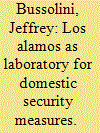

|
|
|
|
|
| Publication |
2011.
|
| Summary/Abstract |
Much of the strategic analysis, geographic knowledge/ignorance, and military-security emphasis of post-September 11th America bore a striking resemblance to Los Alamos of the 1980s. After briefly considering the foreign-policy aspects of the work at Los Alamos and some theoretical, historical, and state aspects of the nuclear age that define the domestic space and the population as targets, I focus on the many ways in which the Laboratory has served as a site of development for domestic security measures. In some cases it is the community of Los Alamos at large which seems to be the template for the measures, inasmuch as this is a town adjoining and surrounding the Laboratory. One of the main thrusts of the argument here is that the division between 'foreign' and 'domestic' in contemporary intelligence and military strategy is specious.
|
|
|
|
|
|
|
|
|
|
|
|
|
|
|
|
| 6 |
ID:
105346


|
|
|
| 7 |
ID:
105351


|
|
|
|
|
| Publication |
2011.
|
| Summary/Abstract |
The proliferation and development of media during the current war in Iraq and the opening of the Iraqi media landscape, which had heretofore been dampened through authoritarian state control and international isolation due to economic sanctions, has played a role in political articulation and identity formation throughout the occupation in a fashion not seen during previous conflicts. The adoption of media tools, emerging as both technology and its applications - often referred to as Web 2.0 - impacted both combatants and civilians caught within the conflict providing them the opportunity to capture and articulate their own experience in a fashion never before available. This investigation points to the potential impacts on current political action, the resourcefulness of opposition access to media, as well as dangers posed through the emotive content most often produced. We argue that while such media production is disassociated from surrounding events (or decontextualised), its nonetheless trusted and impactful due to its viral distribution and sourcing networks and diverse in its impact on those not intimately involved due to its lack of overarching narrative and production away from sites of power.
|
|
|
|
|
|
|
|
|
|
|
|
|
|
|
|
| 8 |
ID:
105352
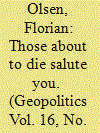

|
|
|
|
|
| Publication |
2011.
|
| Summary/Abstract |
This exploratory article argues that the mobilisation process for the war in Iraq has revealed and exacerbated the fault lines across American society and brought on a crisis in army-society relationships in the US to which the state has ultimately responded by announcing it would withdraw troops from Iraq. To explore these tensions, I present the analytical framework of "American imperial society" as an alternative problematisation of 'empire' and hope to show its utility to highlight how the repercussions of the US's political ambitions abroad are felt far beyond the battlefield. In doing so, it also provides the first account of empire which builds on the sociology of Pierre Bourdieu. I finally explore these questions by looking at the debate taking place over the meaning and legitimacy of American military sacrifice in three major American newspapers and two magazines.
|
|
|
|
|
|
|
|
|
|
|
|
|
|
|
|